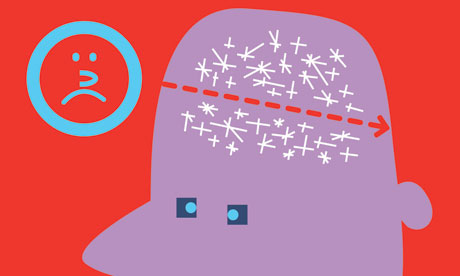
Sorry to moan, but have you seen the bad press complainers have been getting lately? Sometimes – hey, don't back away, I want you to listen! – it seems as if you can't open a lifestyle magazine, or self-help book, without being lectured on the importance of avoiding whiners. According to one typical piece, from the American business magazine Inc, spending 30 minutes with a complainer literally destroys your brain, "peel[ing] away neurons in the brain's hippocampus". Yes, you read that correctly. Just half an hour listening to a colleague complaining – about the broken office printer, say, or the aggravating popularity of simplistic brain-based explanations for complex mental phenomena – will turn you into a zombie. Complaining, says British-born entrepreneur Trevor Blake, whose new book, Three Simple Steps, is the source of that neuron-peeling claim, is "a cultural disease in the western world". You owe it to yourself to use protection.
This latest angle on the curse of moaning involves some rather liberal extrapolations from the work of the neuroscientist Robert Sapolsky, about neural degeneration in the presence of "high stressors". But I don't mean to single Blake out. Self-help's hostility to whiners – also known as "toxic people", "energy vampires" and "life leeches" – is long-standing, reaching from its most new agey corners (one such title is Psychic Vampires: Protection From Energy Predators & Parasites) to its most science-heavy. And the advice is usually the same: get away from them, or screen them out. Blake cites a trick that golfer Seve Ballesteros apparently used when faced with a hostile crowd: "He imagined a bell jar no one could see, descending from the sky to protect him."
Let's be clear: there are people it's best to block out. But the label of "complainer" is useless for identifying them, as it encompasses so much. If the complainer is your depressed close friend, you might choose to engage out of compassion, peeling neurons be damned. If it's a spouse who relentlessly belittles you, "screening out" won't work: you might have to leave. If your whining employee is whining about harassment, you'd better listen, not imagine a bell jar. Even genuinely trivial complaining, as the psychologist Robin Kowalski points out in her book Complaining, Teasing And Other Annoying Behaviours, can serve as a conversational icebreaker. Besides, in condemning people as complainers, we're dicing with the "fundamental attribution error": when I do something obnoxious, it's an understandable response to my situation, but when someone else does, it's because of an obnoxious personality. But if your office is full of moaners, maybe the problem's not the moaners but the office: the lights, the chairs, the lack of privacy.
The anti-whiner crowd, I think, are really targeting the subset known as "help-rejecting complainers": people who seek advice, then spurn it, because their real motive is to prove they're unhelpable. They're playing the game Eric Berne, in his 1960s bestseller, Games People Play, called "yes, but": offer a solution, and they'll find a reason to reject it. The right response is to refuse to play the game. Break the cycle by agreeing sympathetically. Or (and Blake does suggest this) ask: "What do you plan to do about it?" As for the other kind of complainer – the ordinary kind – you'll probably just have to learn tolerance. Because the technical term for them is "everybody".
oliver.burkeman@theguardian.com
Follow Oliver on Twitter.

